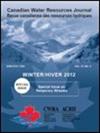‘That water out there is no damn good for anybody’: Experiences with declining water quality in a First Nation community
IF 1.7
4区 环境科学与生态学
Q3 WATER RESOURCES
引用次数: 0
Abstract
Abstract In many Indigenous communities, the wellbeing of waterways correlates to the health of the population that it supports. However, current laws and water governance systems often fail to protect water sources and jeopardizes health and wellbeing, particularly in Indigenous communities. This study, curated by an Anishinaabe First Nations community located in Ontario on the Lake of the Woods (LOTW), was designed to detail the varying impacts of adverse water quality on people in the community. A community-based participatory research approach included interviews with Elders and key informants to understand lived experiences of adverse water quality, sources of pollution, and individual and community impacts. Key findings revealed changes in water quality within and between years, with water quality degrading over time. Further, changes in water quality were associated with changes in the community’s health, food sources, and activities. Finally, a paternalistic colonial history between Indigenous people and the Government of Canada continues to resonate and cause strained jurisdictional relations between the two groups. Opportunities and future water stewardship strategies require the active participation and inclusion of Indigenous people in policymaking, programming, and water management. As proposed by the LOTW community, this includes improving water quality monitoring, upgrading septic systems in the community, reintroducing wild rice to the shorelines, and creating water activities programming for Indigenous youth.“外面的水对任何人都没有好处”:第一民族社区水质下降的经验
在许多土著社区,水道的健康关系到它所支持的人口的健康。然而,现行的法律和水治理制度往往不能保护水源,并危及健康和福祉,特别是在土著社区。这项研究是由安大略省森林湖(LOTW)上的一个Anishinaabe第一民族社区策划的,旨在详细说明不良水质对社区居民的不同影响。以社区为基础的参与性研究方法包括与老年人和关键线人进行访谈,以了解不良水质、污染源以及个人和社区影响的生活经历。主要发现揭示了年内和年间水质的变化,水质随着时间的推移而退化。此外,水质的变化与社区健康、食物来源和活动的变化有关。最后,土著人民和加拿大政府之间的家长式殖民历史继续引起共鸣,并造成这两个群体之间的管辖关系紧张。机遇和未来的水资源管理战略要求土著人民积极参与决策、规划和水资源管理。根据LOTW社区的提议,这包括改善水质监测,升级社区的化粪池系统,将野生水稻重新引入海岸线,并为土著青年制定水活动计划。
本文章由计算机程序翻译,如有差异,请以英文原文为准。
求助全文
约1分钟内获得全文
求助全文
来源期刊

Canadian Water Resources Journal
WATER RESOURCES-
CiteScore
2.90
自引率
5.90%
发文量
17
审稿时长
>12 weeks
期刊介绍:
The Canadian Water Resources Journal accepts manuscripts in English or French and publishes abstracts in both official languages. Preference is given to manuscripts focusing on science and policy aspects of Canadian water management. Specifically, manuscripts should stimulate public awareness and understanding of Canada''s water resources, encourage recognition of the high priority of water as a resource, and provide new or increased knowledge on some aspect of Canada''s water.
The Canadian Water Resources Journal was first published in the fall of 1976 and it has grown in stature to be recognized as a quality and important publication in the water resources field.
 求助内容:
求助内容: 应助结果提醒方式:
应助结果提醒方式:


